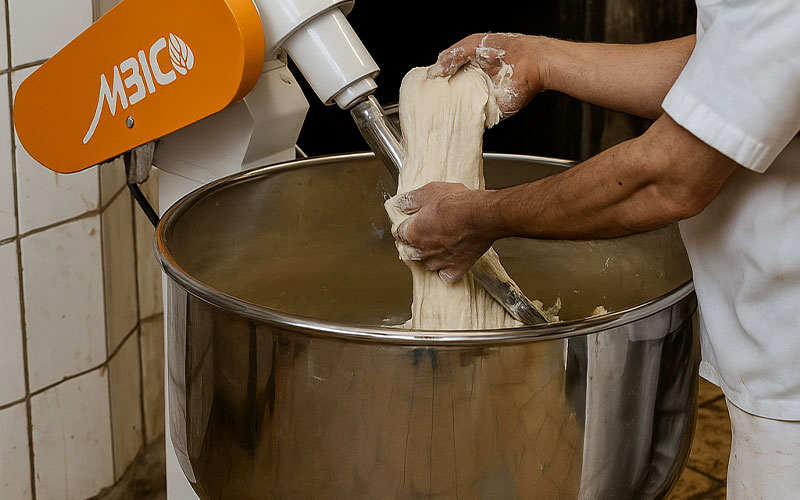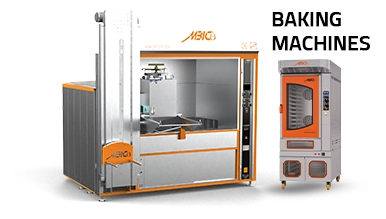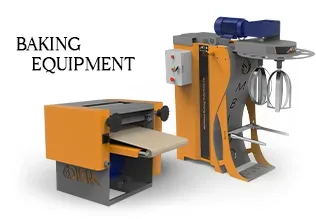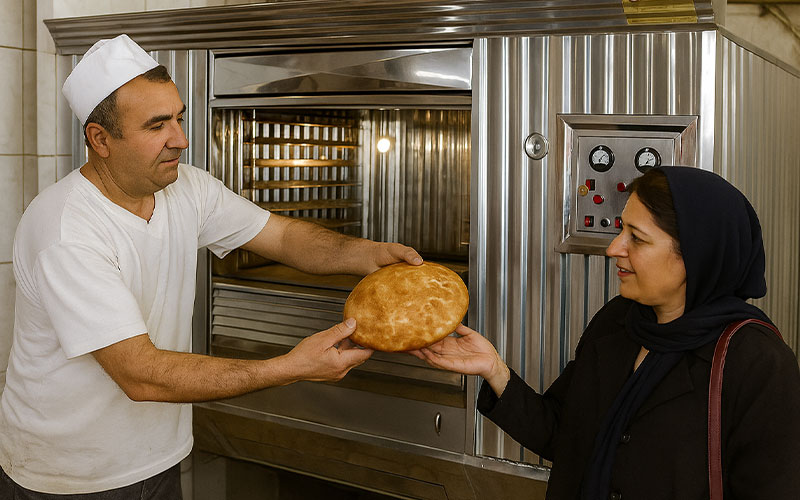Articles
A Comprehensive Review of the Mashhad Baking Industries (MBICO) Rotary Oven
The commercial bakery oven is the single most important asset in your production line. It is the indispensable heart of your operation. Choosing the right industrial equipment defines the consistency of your product, the efficiency of your staff, and ultimately, your overall profitability.
Why Selecting Your Professional Bakery Oven is the Most Critical Business Decision
From an Experienced Baker’s Perspective
Hello to all my colleagues and fellow members of the professional baking industry. For over two decades, I’ve lived my life surrounded by the unique, intoxicating aroma of flour, yeast, and perfectly proofed dough. My professional experience runs deep, spanning the evolution of baking technology.
I have firsthand experience working with every type of equipment imaginable—from my grandfather’s traditional brick ovens to the precision of modern European deck ovens, and the high-capacity industrial giants manufactured right here in Iran. I have memories with each one, tied to crucial moments of success and failure.
I vividly recall the moment I fired up my first large-scale industrial oven from Mashhad Baking Industries (mbico). The sound of the fan and the profound roar of the powerful burner were not just mechanical noises; they were the robust heartbeat of a newborn, revenue-generating workshop.
This foundational experience has taught me one crucial lesson: the oven dictates the quality, speed, and energy efficiency of everything else you do. Getting this decision right is not a luxury—it is a mandatory investment in your bakery’s future. In this comprehensive guide, we will analyze the key factors that separate a basic purchase from a truly transformative, long-term business asset.
That day, I understood that an oven isn’t just a piece of metal; it’s the beating heart of a bakery. All the effort we put into preparing the dough, all the kneading and shaping, is ultimately entrusted to the oven. A good oven can turn the fruit of your labor into a golden masterpiece, while a bad one can lay all your hard work to waste. That’s why I say that choosing an oven is the most vital and strategic decision a baker or pastry chef makes in their professional life.
Over the years, I’ve seen many names come and go in the market, but some have endured. One of these names, always spoken of with respect among my colleagues, is Mashhad Baking Industries, or MBICO. A company that started its journey in 1991 and now has its machines not just in Iran, but in corners of the world.
To be honest, my initial view of MBICO was like that of any other high-quality domestic brand: a strong company from Mashhad that knows its craft. But when I heard that my colleagues in Germany and Canada were using their ovens and that their machines held the stringent European (CE) and American (UL) certifications, my perspective completely changed. This was no longer just a marketing claim; it was a global endorsement. When a machine can pass the standards of competitive and highly regulated markets like Germany, the USA, Australia, and over 40 other countries, it means it has reached a world-class level in engineering, safety, and manufacturing quality. For me, looking to make a significant and long-term investment, this was a powerful and reassuring signal.
In this article, I want to share my years of experience with the MBICO Confectionery and Artisan Rotary Oven. We’ll cover everything from a technical teardown of the machine to the secrets of baking various breads and pastries, and a comparison with other options on the market. This is an unbiased and entirely practical review to help you, my dear colleagues, choose the beating heart of your workshop with open eyes.
Clarifying a Common Misconception
Before we begin, I need to clear up one point. You might come across the brand “embico” in the market, which sells household kitchen items like spice jars, kettles, and teapots. This brand has no connection whatsoever with Mashhad Baking Industries (MBICO), the manufacturer of industrial ovens. They are two completely separate entities and should not be confused. Our focus in this article is exclusively on the professional and industrial products of Mashhad Baking Industries.
Part 2: Anatomy of the MBICO Rotary Oven – Beyond the Steel Sheets
When an experienced baker is looking to buy an oven, the first thing they look at isn’t the digital control panel or the shiny exterior. They go for the oven’s “skeleton.” I’ve seen cheap ovens that, after a few years of continuous use, have buckled under the heat and their own weight, their doors warped and no longer sealing properly. An oven with a weak chassis is like a building with a flimsy foundation; sooner or later, it will collapse. In this section, let’s see what’s under the stainless steel facade of the MBICO rotary oven.
- Frame and Structure (Chassis): The Machine’s Backbone
The chassis, or framework, is the most critical part of an industrial oven for ensuring its longevity and stable performance. A weak chassis will deform over time under thermal stress (constant expansion and contraction). This deformation sets off a disastrous domino effect of problems:
- Loss of Door Seal: The first casualty is the oven door. When the chassis warps, the door no longer sits properly on the frame. The result? A terrible loss of heat, a staggering increase in fuel consumption, and uneven baking.
- Increased Vibration and Wear: A deformed chassis causes mechanical parts like the motor and rotation system to go out of alignment. This dramatically increases the machine’s vibration and noise, accelerating wear and tear.
- Reduced Baking Quality: When the door doesn’t seal properly, cold outside air mixes with the hot, humid air inside the cabin. This fluctuation in temperature and humidity is a deadly poison for sensitive breads like baguettes.
MBICO ovens appear very robust in this regard. An interesting feature is that they can be manufactured in a fully demountable (bolt-and-nut) format. This feature, designed for installing the oven in spaces with small entrances, sends an important message: the parts of this oven are machined with high precision and very low tolerance.
- Heating System: The Magic of Indirect Heat
All models of the MBICO rotary oven use a 100% indirect heating system. This means the flame or heating elements never come into direct contact with your product—a crucial advantage for hygienic and high-quality baking.
- Furnace and Heat Exchanger: The heart of the system, the furnace, must be made from special heat-resistant steel alloys to withstand very high temperatures and humidity without deforming. MBICO’s specifications mention the use of high-quality raw materials and a high-efficiency heat exchanger design that reduces fuel consumption.
- Air Circulation System: A powerful centrifugal fan circulates hot air through ducts, ensuring heat reaches all trays evenly. This convection eliminates the need for the baker to move trays around.
- Insulation and Energy Efficiency: Guarding Heat and Capital
A good oven should act like a high-quality thermos. MBICO ovens use multi-layer insulation with dense rockwool and a double-glazed, heat-resistant glass door. This combination minimizes heat loss, optimizes fuel consumption, and keeps the workshop environment cooler.
- Trolley and Rotation System: A Smooth Ride for a Delicate Dough
The rotation system includes a mobile trolley that rolls in and out smoothly. A clever detail is the ramp at the cabin entrance, which prevents the trolley from being jolted. Dough that has spent hours proofing is very delicate, and a sharp jolt can ruin its structure. The rotation system is also designed to be very smooth and gentle.

Part 3: The Art of Baking with the MBICO Rotary Oven
No matter how technically advanced an oven is, it must prove itself in the workshop. Here’s my practical experience with this oven for baking different products.
- Baking Voluminous and Artisan Breads (Baguette, Ciabatta, Shirmal)
For these breads, two factors are key: Oven Spring and Crust Formation. Both depend on the steam system.
The powerful steam system in the MBICO oven, called the “waterfall steam system,” creates a moisture-saturated environment in the first few minutes of baking. This moisture settles on the dough’s surface, keeping it soft and flexible, which allows the bread to expand to its maximum potential. Without steam, the crust forms too quickly, stopping the bread from rising.
Furthermore, this moisture causes the gelatinization of starches on the dough’s surface. When we vent the steam later, this layer dries into a shiny, crisp, and golden-brown crust. Ovens equipped with this system are ideal for these types of breads.
- Baking Delicate Cakes and Pastries (Sponge Cake, Danish Pastry, Cookies)
In the world of pastry, steam is the enemy! For products like sponge cake, cookies, and laminated doughs, we need dry, even, and gentle heat. The indirect heat and air circulation of the MBICO oven provide exactly these conditions.
For example, when baking a Danish pastry, the gentle, circulating heat allows the butter layers to melt slowly, creating steam that separates the dough layers into a crisp, flaky texture without burning the surface.
- Applications Beyond the Bakery (Pizza, Roasted Chicken, Catering)
One of the biggest advantages of this oven is its incredible versatility. It’s not just a bakery oven; it’s an all-purpose workhorse for industrial kitchens. Its ability to reach high temperatures (up to 400°C) makes it suitable for baking pizza, and its high capacity is a major advantage for large catering operations. A restaurant or hotel can use a single machine for both its daily bread and a large part of its food menu.
Part 4: The Command Center – Smart Control of the Baking Process
The brain of the MBICO oven is its advanced control panel. These ovens are equipped with a PLC (Programmable Logic Controller) system and an HMI (Human-Machine Interface). For a baker, this means precision, repeatability, and reduction of human error. The PLC is an industrial computer controlling all functions, and the HMI is the touchscreen you use to communicate with it.
One of the best features is the ability to save custom baking programs. I can define a program for each product (“Barbari,” “Danish Pastry,” etc.) that includes all baking stages. A worker just needs to select the program and press start. This ensures the quality of my bread is the same on every shift.
Another interesting innovation is “sinusoidal baking.” Instead of a constant temperature, the oven follows a profile that gently rises and falls. This mimics a traditional baker controlling the fire, resulting in gentler heat transfer, better moisture retention, and more thorough baking.
Part 5: Ownership and Maintenance – A Long-Term Investment
Buying a rotary oven is a long-term investment. You need to consider its running costs and lifespan.
- Running Costs: Fuel and Energy Consumption
According to the specs, the MBI DR 2100 model is very efficient compared to older ovens, thanks to its well-designed heat exchanger and strong insulation. This plays a direct role in reducing your long-term costs.
- Daily Service and Maintenance: A Meticulous Baker’s Checklist
- Daily: Clean the door glass and oven floor. Listen for any unusual noises.
- Weekly: Check the door seal and fan functions. Ensure the burner has a clean, blue flame.
- Monthly: Check the rotation chain tension and grease bearings as instructed.
- Troubleshooting Common Problems
- Unusual Noise: Usually caused by worn bearings or a loose chain.
- Uneven Baking: Could be a faulty circulation fan, uncalibrated thermostat, or a bad door seal.
- Burner Not Igniting: Serious Warning: If the burner fails to ignite after two attempts, never try again. Gas can accumulate and cause an explosion. Turn off the gas and call a technician.
- MBICO’s After-Sales Service and Warranty
Mashhad Baking Industries offers its products with a one-year warranty and lifetime after-sales service. The lifetime service is what truly matters. It means I can be confident that 10 years from now, if I need a spare part or a specialized technician, the company will be there to support me.
Part 6: Comparison and Final Verdict – Is the MBICO Rotary Oven Right for You?
Is the MBICO rotary oven the right choice for your business?
- MBICO Rotary Oven vs. Competitors
While other reputable brands exist, MBICO stands out in several key areas:
- International Credibility: Exporting to strict European and American markets and obtaining CE and UL standards is a major competitive advantage, proving a global level of engineering.
- Advanced Control System: Features like the PLC controller and “sinusoidal baking” put MBICO a step ahead in automation and quality consistency.
- Complete Product Ecosystem: MBICO offers a complete solution for a production line, from mixers and sheeters to various ovens, allowing you to source all equipment from one reputable place.
- Summary of Pros and Cons from a Baker’s Perspective
Pros:
- ✅ Perfectly Uniform Baking: Consistent quality across all trays.
- ✅ Incredible Versatility: Bakes bread, pastry, cake, pizza, and food in one machine.
- ✅ High Build Quality and Durability: Built to last with high-quality materials.
- ✅ Precise and Smart Control: PLC panel minimizes human error.
- ✅ Energy Efficiency: Reduces long-term fuel costs.
- ✅ Support and Credibility: Strong warranty, lifetime service, and international brand trust.
Cons:
- ❌ High Initial Cost: A significant investment compared to other options.
- ❌ Space Requirement: Rotary ovens require a relatively large installation space.
- Final Recommendation for Different Businesses
- For Industrial Bakeries and Mass Production: An unparalleled choice. The speed, consistency, and durability will compensate for the initial cost.
- For Café-Bakeries and Boutique Patisseries: A necessity. Its versatility allows you to produce a wide range of products—from artisan breads to delicate pastries—in a single oven. The model with a steam system is ideal.
- For Large Caterers and Restaurants: An all-purpose workhorse. The high capacity and ability to cook a wide range of food make this oven the backbone of your kitchen.
Final Word
An oven is a baker’s partner in the art of creation. The Mashhad Baking Industries rotary oven is a reliable, powerful, and smart partner. The initial investment may seem heavy, but the quality, durability, and consistency it brings make it a wise choice and a secure investment for the future of your business.







Explore MBICO's categories
Bakery equipment
13 Products
bulk and semi-bulk bread baking ovens
3 Products
Bulk Breads Baking equipment
14 Products
Confectionery equipment
7 Products
Mini ovens
3 Products
Pizza and food ovens
4 Products
Baking equipment
25 Products
Bakery oven
5 Products
Tafton baking ovens
3 Products
Barbari baking ovens
4 Products
Sangak bakery ovens
3 Products
Lavash baking ovens
3 Products
Pastry and confectionery ovens
3 Products
Baking ovens
10 Products
Mobile baking machines
4 Products
Explore MBICO's products
Pastry Dough Sheeter
Fixed Rotary Semi-Automatic Oven for Baking Traditional Breads
4-Roll Dough Sheeter
2-Roll Dough Sheeter (2-Roll Tabletop Dough Sheeter)
Conveyor Pizza Oven
Confectionery Mixer
Convection Oven
Flour Sifting Machine